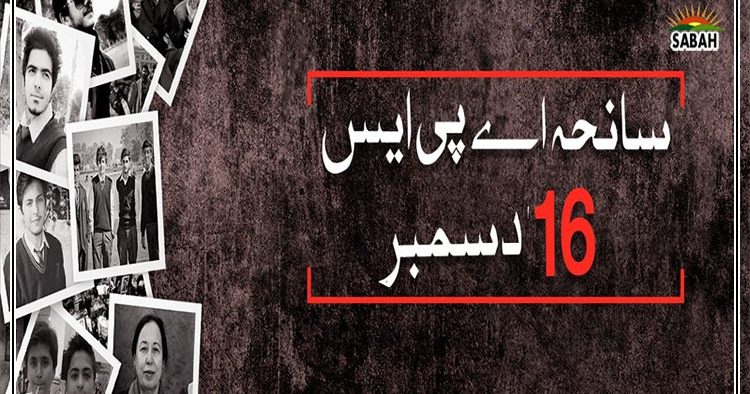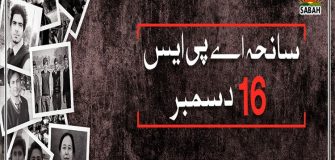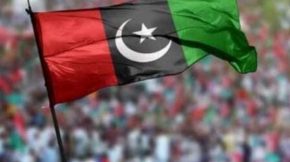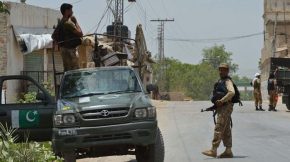Peshawar (Urdu Times) National Action Plan December 16th tragedy of Army Public School and politics on religious Madrasa……?

The sacrifices of the martyrs of Army Public School can never be forgotten. The tragedy of December 16, 2014 is a deep wound that cannot be healed. Politics is being done on the registration of religious Madrasa under the National Action Plan.
After the Army Public School tragedy in Peshawar on December 16, 2014, it seemed that the state policy after 1980 had changed to a great extent.
Religious schools and terrorism remained a major challenge for the National Action Plan as well As a result of the December 16th tragedy, a National Action Plan was agreed upon after continuous consultations between the political and military leadership, which also yielded some positive results. The points decided in the National Action Plan also included the fact that the regular registration of religious schools would be ensured and such steps would be taken that religious schools would become part of the “solution” and not the “problem”. This desire of the national leadership was highly commendable because the role of the teachers and students of these madrassas in promoting or reducing ideological and intellectual extremism, sectarian intolerance and extremist attitudes cannot be denied.
It should be noted that on September 7, 2015, an important meeting was held at the Prime Minister’s Secretariat regarding religious madrassas, in which the heads of the five federations of religious madrassas, the then Prime Minister Nawaz Sharif and Interior Minister Chaudhry Nisar Ali Khan, Army Chief General Raheel Sharif and DG ISI General Rizwan participated. According to reports, it was decided in the meeting that the registration of madrassas would be made easier. In order to document the details of the income and expenditure of religious madrassas, the steps would be simplified for opening their accounts in banks and the accounts of the madrassas would be audited. A committee would be formed to formulate a curriculum in line with contemporary requirements. Obviously, such decisions have been taken before, but the practical result had not come to light yet. However, due to the “special nature” of this meeting, it was likely that steps towards practical progress would be initiated. A large section of the people of Pakistan, despite being unaware of the true meaning and requirements of their religion and not arranging for the observance of the required manifestations of Islam, still believe in and believe in their importance. Regarding these manifestations, they rely on the scholars, preachers and imams of mosques and consider their opinions as authoritative in religious matters. Therefore, it is the need of the hour to make the system, curriculum and finances of religious schools, the curricular and co-curricular activities going on in them and their effects the subject of in-depth research.
It is common in religious schools that their current system and curriculum are failing badly in the eyes of the enemies of Islam and everyone is formulating and arranging various plans to thwart it. According to the teachers and students of religious schools, no Muslim is responsible for the 9/11 incident. What is the position of the Jews so that a strong excuse can be found to eliminate Muslims? The issue of registration of religious schools has been pending for a long time. A lot of work was done on this during the tenure of General Pervez Musharraf, but a consensus has not yet emerged. It can be said with complete certainty that if the religious schools are satisfied that the government wants to resolve this issue with “good intentions”, then they will cooperate fully. Religious schools should be seen from an educational perspective, not from a law and order perspective. In the context of the most important meeting on September 7, 2015, it is hoped that a better solution to this problem will be found. In our country, religious schools have been registered under the Society Act, which comes under the Ministry of Industries, meaning the entire system of thousands of religious schools comes under the Ministry of Industries and Commerce. Obviously, this is quite ridiculous. Religious schools are basically institutions that provide religious education, they should be managed under the Ministry of Education or the Ministry of Religious Affairs, what about the Ministry of Industries? In fact, welfare and charitable institutions are registered under the Society Act. The madrassas are of the opinion that since we also do welfare work, we should also come under the Society Act. There have been 5 major organizations of religious schools, one of which is Wifaq Al-Madaris Al-Arabiya Pakistan or in common language Wifaq Al-Madaris and Deobandi madrasas are associated with it. Maulana Hanif Jalandhari is its spiritual leader and supreme leader, nowadays Mufti Taqi Usmani is its president and Maulana Fazlur Rehman always provides his full support to the Wifaq Madaris and the madaris of the federation and their students become the hands and arms of the Maulana.
The second big and important organization is the Tanzeem al-Madaris Ahle Sunnah, to which the Barelvi madaris are affiliated and Mufti Muneeb ur Rehman is its president. The third organization is the organization of Ahle Hadith or Salafi madaris called Wifaq al-Madaris al-Salafiya and Professor Sajid Mir is its president. While the fourth is for the madaris that are affiliated with the Jamaat-e-Islami, their organization is Rabeebat al-Madaris al-Islamiya and Maulana Abdul Malik is its president. Shia madaris are affiliated with the Wifaq al-Madaris Shia Pakistan.
Let us call these five organizations the boards of madaris, they conduct the examinations of the students of the numerous madaris affiliated with them. These five organizations come together on the platform of ‘Ittehad-e-Tanazeem Madrasas Pakistan’ and present their issues etc. In 2019, when Imran Khan was the Prime Minister, the government, after negotiations with Ittehad-e-Tanazeem Madrasas, signed an agreement on August 29, 2019, under which madrasas will henceforth be registered under the Federal Ministry of Education and Professional Training. This ministry will be the only authorized authority to collect data on madrasas and universities from across the country. Under the agreement, the federal government will be authorized to close those madrasas and universities that are not registered with the Federal Ministry of Education. Under the same ministry, the Federal Ministry of Education will assist all registered madrasas in opening accounts in scheduled banks. Another important issue that religious madrasas faced was related to foreign students. The agreement said that foreign students would be given educational visas for 9 years to study in these registered madrasas. There was also a clause regarding encouraging contemporary education (matriculation, FA, etc.) in madrasas. This Madrasa Registration Bill was signed by the leaders of the five organizations, namely Mufti Taqi Usmani Sahib, Maulana Hanif Jalandhari, Professor Sajid Mir, Mufti Muneeb-ur-Rehman, Maulana Abdul Malik, etc. This agreement is 5 years old. Maulana Fazlur Rehman supported the government on the 26th Constitutional Amendment and helped get it passed. So, along with the amendment, he also got a bill (act) for the registration of religious madrasas passed to satisfy the audience of his traditional madrasas and religious students. A major fundamental clause in it is that religious madrasas will now be registered under the Ministry of Industries and Production instead of the Ministry of Education. This bill was passed by the Senate and the National Assembly with amendments on the same day, however, when it was sent to the President, he stopped it. Reacting to the objections raised by the President against the Madrasa Bill, Jamiat Ulema-e-Islam (F) spokesperson Aslam Ghauri said that President Asif Ali Zardari’s objections to the Madrasa Bill are surprising. The method of the President’s objections is not in accordance with the law, President Asif Zardari’s objections were not raised within the period given in the constitution. Earlier, JUI-F Senator Maulana Abdul Wasi, while addressing the Senate, had hinted at a protest in the federal capital if the Madrasa Bill was not passed.
It should be noted that JUI-F leader Hafiz Hamdullah had said that the cat is out of the bag with the President’s objections to the Madrasa Registration Bill. The objections raised by the President have proven that the parliament is not Pakistan’s but the parliament of FATF. Reacting to the statement of the Jamiat Ulema-e-Islam (F) leader, Federal Information Minister Atta Tarar has said that the objections raised by President Asif Ali Zardari against the Madrasa Bill do not mention FATF nor do they have any connection with it. The objections raised on the bill are legal and constitutional.
Atta Tarar said that politicizing legal and constitutional matters is not in anyone’s interest, linking the registration of madrassas with the Financial Action Task Force (FATF) is tantamount to idle imagination and speculation. The procedure for making laws is clear in the constitution, the President has raised constitutional objections and these should also be corrected constitutionally by the parliament. Unnecessary rhetoric and criticism for the sake of criticism on this issue should be avoided and the powers of the President and the parliament should be targeted. The Federal Information Minister said that the bill related to madrassas could not take legal form due to complications, and efforts will be made to find a solution acceptable to everyone, including Fazlur Rehman, on madrassas. Addressing a meeting of scholars and mashaikhs regarding the registration and reforms of madrassas, Atta Ullah Tarar said that a system was formulated after extensive consultation to bring madrassas into the mainstream and register them, under this system 18,000 madrassas registered. Whenever a law is made, it has a code of conduct, when madrassas were brought under the federal education ministry, it brought benefits, HEC and all universities are under the same education ministry. The efforts of scholars are involved in the registration of madrassas, the fruits of the registration of madrassas have started to be seen, it is happy that students of madrassas are becoming doctors and engineers. The government will consult on the suggestions of scholars, Maulana Fazlur Rehman is respected, and they will also listen to their suggestions. On this occasion, Federal Education Minister Khalid Maqbool Siddiqui said that the presence of madrassas in the country is a source of morale for the nation, madrassas have borne a huge burden of the nation, and the purpose of registration is not to control madrassas. Allama Raghib Naeemi, head of the Islamic Ideology Council, said that the issue of madrassas is religious, it should not be made into an arena, now there is no external threat to the madrassa system, and the Directorate General of Religious Education has solved many problems. The degree of students graduating from religious madrassas is given as equivalent to MA, it should be given the status of BS. On this occasion, Allama Tahir Ashrafi said that the federal ministers are requested to maintain the current order and keep the madrassas affiliated with the Ministry of Education. All the boards of madrassas should be taken into confidence in any legislation related to madrassas. The agreement that was reached has the signatures of their leaders, not ours. There are millions of students in madrassas, everyone has the power, we do not want conflict, and will new laws be made every day? He said that if a law is made after every 5 years, then the students of madrassas will be affected. It should be noted that Jamiat Ulema-e-Islam chief Maulana Fazlur Rehman had directed workers in Peshawar to be ready to march towards Islamabad over the government’s reneging on its promise on the bill regarding madrassas. The JUI chief had said that at the time of the constitutional amendment, it was said that one thing that has been decided should be presented in parliament and approved. In a meeting with the PPP chairman in Karachi, we discussed the constitutional amendment and the religious madrassas bill for 5 hours, after which we reached a consensus.










